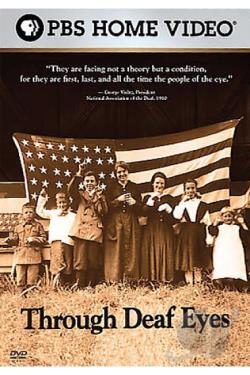 PBS had a sale, and I bought this DVD. Naturally it's something I would take a strong interest in. I really some of the points brought up and some of the stories told. The documentary is a lot of different deaf people talking, and some Deaf-produced films. Some of the deaf people use sign language, some are "oral" successes, some have cochlear implants.
PBS had a sale, and I bought this DVD. Naturally it's something I would take a strong interest in. I really some of the points brought up and some of the stories told. The documentary is a lot of different deaf people talking, and some Deaf-produced films. Some of the deaf people use sign language, some are "oral" successes, some have cochlear implants.The theme is the same though: they are happy being deaf or have learned to live with it. As one man says, "It's no different than being a man instead of a woman, being short instead of tall..."
Don't try to fix us.
I appreciated many aspects of this film. I especially like how it talked about cochlear implants and how though a great device for some, it does have its disadvantages. It kills all the auditory nerves in your ear, making the receiver unable to hear unless they are wearing the implant. *This film was released in 2007, and perhaps this has since changed, but I know was warned by my audiologist about the possible loss of what I had left should I pursue this option myself.*
Different things I learned from this film:
Thomas Hopkins Galludet was responsible for the first school for the deaf in the U.S. The reason: he wanted to teach deaf people the word of god. He brought over a French teacher with his French sign language, who then adjusted the language to some of the signs already being used in the United States and thus, ASL was born.
 |
| AGB |
He felt that the deaf should be forced to lip read and speak, not grow dependent on signs and thus cut themselves off from the hearing world.
But...but as a lady points out in this documentary, we then end up spending so much time just learning to talk and lip-read that we don't focus as much as basic education or I should say, advanced education. And lip-reading is EXHAUSTING.
I have to agree with BOTH AGB and the lady. Had I learned solely Sign Language, I would not have had some of the jobs I've had, I'd not have been able to communicate with family members at all. I'd be shut off from just about everyone I know, so for me lip-reading was the path, but it is indeed exhausting and I do feel...not entirely immersed in either world. But I feel this documentary did explore the variety of choices and in the end, it's not up to AGB or the lady. It's up to the deaf person what path they wish to pursue.
We also meet some people who interact in both worlds.
This briefly touches on the silent film and how it was a disappointing transition for deaf people when sound was introduced as it was a long time before captioning came to be.
The football huddle you see today...was created by deaf players.
 |
| An old TTY, 70s model? |
“They would charter a plane, bring the deaf boy in the cockpit. The plane would take off and do loops, hoping the boy would get his hearing back again.”
It took 90 years from the inventing of the telephone for TTY to be introduced, allowing us to communicate that way. And this is all thanks to a man named Robert Weitbrecht, a reclusive deaf man who loved dogs. With two other people, he set up a teletypewriter and a modem and made the clicking of a key transmit a sound that upon reaching its destination would transfer back to a letter.
This is very cool to me. It took a while for this invention to catch on and become what you see in the picture above because teletypewriters were hard to come by and weighed 200 pounds.
And it comes as no surprise to me, the revelation that the Civil Service passed a law in 1906 saying they would no longer deaf or HoH people... Though turned over two years later, I know from personal experience the seed that was planted did indeed grow into a tree. Hum.
Very interesting documentary, though I could have done without some of the "films" and especially the weird performance about the bucket....I have no idea what was going on there. But I'm simply not that artistic. I don't "get" the ballet either.


No comments:
Post a Comment